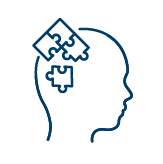The relationship between the intestinal microbiota, the gut and the brain


Brain health is a term covering many diseases ranging from depression, autism and cognitive impairment. These mental health challenges result from a combination of genetic, social, psychological, biological and environmental factors. Notably, there is growing interest in the connection between gut microbiota and brain health as a contributing factor to the rising prevalence of mental disorders.
Focus areas
One of Winclove Probiotics focus areas is understanding the mechanisms of gut-brain communication in the human body. Joining forces helps us to advance the crucial conversion of research results into evidence-based solutions. That’s why Winclove is always looking for partnerships, especially where depression, cognition and autism are concerned.
Microbiota-gut-brain axis
Gut microbiota and impaired cognitive function

There is compelling evidence linking gut microbiota composition to the gut-brain axis. Animal studies in particular show that reduced anxiety -and depression- like behaviours were observed in those raised in germ-free environments. Human research further underscores this connection, revealing differences in gut bacterial composition between healthy individuals and those experiencing depression.
Probiotics and cognition
This offers promise for enhancing cognitive performance by targeting the gut microbiota. Research indicates that probiotics can have a beneficial effect on gut microbiota, leading to improved cognitive function, especially under stress. This suggests probiotics could have significant benefits for cognitive well-being, particularly for high-risk groups such as students during exams.
The intestinal barrier
Within the microbiota-gut-brain axis, communication flows bidirectionally, weaving together neural, endocrine, immune and metabolic pathways. Crucial to this dynamic is the intestinal barrier. It is subject to influence from factors including the gut microbiota, diet, stress, exercise, toxins and certain medications. A compromised barrier function may permit the passage of harmful substances which can trigger immune cells leading to low-grade inflammation. Low grade inflammation is at the core of many chronic conditions such as depression, autism and other brain disorders.
Probiotics and brain health
Studies indicate that probiotics can have a beneficial impact on both gut microbiota and intestinal barrier function. This raises the question of whether they can also enhance brain health. Emerging evidence suggests that the answer is ‘yes’. Recent studies have demonstrated probiotics’ ability to influence the gut-brain axis, leading to positive changes in brain functioning.


